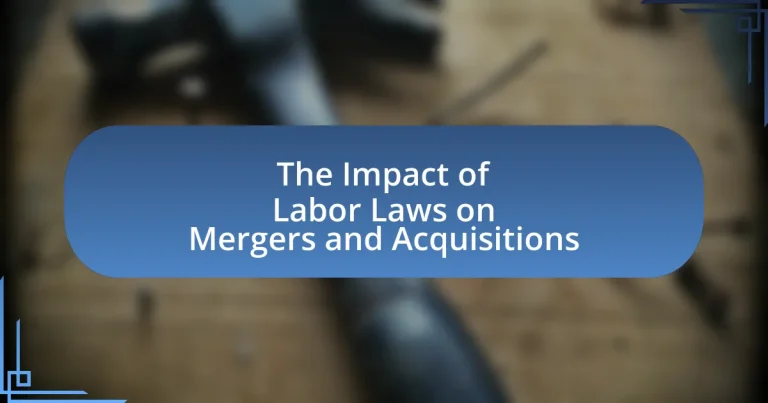Labor laws play a crucial role in shaping the landscape of mergers and acquisitions (M&A) by establishing the legal framework governing employee rights, benefits, and obligations during these transactions. Compliance with labor laws, such as the Worker Adjustment and Retraining Notification (WARN) Act and the National Labor Relations Act (NLRA), can significantly impact the valuation of target companies, influence negotiation strategies, and determine deal structures. This article examines how labor laws affect the M&A process, the specific regulations that are relevant, the challenges companies face, and best practices for ensuring compliance. Additionally, it highlights the implications of varying labor laws across jurisdictions and the role of labor unions in M&A outcomes.

What is the Impact of Labor Laws on Mergers and Acquisitions?
Labor laws significantly influence mergers and acquisitions by dictating the legal framework within which companies operate during these transactions. Compliance with labor laws can affect the valuation of a target company, as potential liabilities related to employee contracts, benefits, and union agreements may arise. For instance, the Worker Adjustment and Retraining Notification (WARN) Act requires employers to provide advance notice of mass layoffs, which can impact the timing and strategy of a merger or acquisition. Additionally, labor laws can lead to increased costs associated with severance packages or negotiations with labor unions, thereby affecting the overall financial feasibility of the deal. Historical data shows that companies that fail to adequately address labor law implications during mergers often face legal challenges and financial penalties, underscoring the critical nature of these regulations in the M&A process.
How do labor laws influence the M&A process?
Labor laws significantly influence the M&A process by dictating the legal obligations and rights of employees during mergers and acquisitions. These laws can affect the valuation of a target company, as potential liabilities related to employee contracts, benefits, and union agreements must be assessed. For instance, in jurisdictions with strong labor protections, acquirers may face challenges such as mandatory employee consultations or the need to honor existing labor agreements, which can complicate negotiations and increase costs. Additionally, compliance with labor laws can lead to delays in the M&A timeline, as companies must ensure that all legal requirements are met to avoid penalties or disputes.
What specific labor laws are relevant during mergers and acquisitions?
The specific labor laws relevant during mergers and acquisitions include the Worker Adjustment and Retraining Notification (WARN) Act, which mandates employers to provide advance notice of significant layoffs or plant closings. Additionally, the National Labor Relations Act (NLRA) governs collective bargaining and protects employees’ rights to organize, which can be affected by changes in ownership. The Employee Retirement Income Security Act (ERISA) also plays a role, as it regulates employee benefits and pension plans during transitions. Compliance with these laws is crucial to avoid legal repercussions and ensure fair treatment of employees during the merger or acquisition process.
How do labor laws affect employee rights in M&A transactions?
Labor laws significantly influence employee rights during mergers and acquisitions (M&A) by ensuring protections related to employment continuity, benefits, and collective bargaining. These laws often require that employees maintain their rights and benefits when a company is acquired, which can include the transfer of employment contracts and the preservation of existing terms of employment. For instance, the Worker Adjustment and Retraining Notification (WARN) Act mandates that employers provide advance notice of mass layoffs or plant closings, thereby safeguarding employees’ rights to information and transition support. Additionally, labor laws may necessitate negotiations with labor unions, ensuring that collective bargaining agreements are honored or renegotiated in good faith, thus reinforcing employee rights throughout the M&A process.
Why are labor laws critical in M&A negotiations?
Labor laws are critical in M&A negotiations because they directly influence the terms of employee contracts, benefits, and potential liabilities. Compliance with labor laws ensures that the acquiring company avoids legal disputes and financial penalties related to employee rights and protections. For instance, the Worker Adjustment and Retraining Notification (WARN) Act mandates advance notice for mass layoffs, impacting the negotiation strategy regarding workforce reductions. Additionally, understanding collective bargaining agreements is essential, as they can affect the integration process and overall employee morale post-merger. Failure to address these laws can lead to costly litigation and damage to the company’s reputation, underscoring their importance in the negotiation process.
What role do labor laws play in determining deal structures?
Labor laws significantly influence deal structures in mergers and acquisitions by establishing the legal framework that governs employee rights, benefits, and obligations. These laws dictate how companies must handle employee contracts, severance packages, and potential layoffs during a merger or acquisition, which can affect the overall valuation and terms of the deal. For instance, compliance with the Worker Adjustment and Retraining Notification (WARN) Act in the United States requires companies to provide advance notice of mass layoffs, impacting the timing and financial planning of the transaction. Additionally, labor laws can impose restrictions on the transfer of employees and their benefits, necessitating careful negotiation and structuring of the deal to mitigate legal risks and ensure compliance.
How can labor law compliance impact the valuation of a target company?
Labor law compliance significantly impacts the valuation of a target company by influencing its risk profile and operational costs. Companies that adhere to labor laws reduce the likelihood of costly litigation, fines, and penalties, which can negatively affect financial performance. For instance, a study by the Economic Policy Institute found that firms with strong labor law compliance experience lower turnover rates and higher employee satisfaction, leading to increased productivity and profitability. Consequently, potential acquirers may assign a higher valuation to compliant companies due to their reduced legal risks and enhanced operational efficiency.
What challenges do companies face regarding labor laws in M&A?
Companies face significant challenges regarding labor laws in mergers and acquisitions (M&A), primarily due to the complexities of integrating different labor regulations and employee rights. These challenges include navigating varying state and federal labor laws, addressing potential union issues, and managing employee contracts and benefits that may differ between the merging entities. For instance, discrepancies in wage laws or employee classifications can lead to compliance risks and potential legal disputes. Additionally, companies must consider the impact of layoffs or restructuring on existing employees, which can trigger legal obligations under laws such as the Worker Adjustment and Retraining Notification (WARN) Act. These factors necessitate thorough due diligence and strategic planning to mitigate risks associated with labor law compliance during M&A transactions.
What are the common legal pitfalls related to labor laws in M&A?
Common legal pitfalls related to labor laws in M&A include failure to conduct thorough due diligence, inadequate communication with employees, and non-compliance with labor regulations. Due diligence is critical as it uncovers potential liabilities such as pending lawsuits or union negotiations that could affect the transaction. Inadequate communication can lead to employee unrest or loss of key talent, impacting the integration process. Non-compliance with labor laws, such as failing to honor collective bargaining agreements or not adhering to employee rights, can result in legal disputes and financial penalties. These pitfalls can significantly hinder the success of mergers and acquisitions, as evidenced by cases where companies faced lawsuits or regulatory scrutiny post-transaction due to overlooked labor issues.
How can companies mitigate risks associated with labor law violations during M&A?
Companies can mitigate risks associated with labor law violations during mergers and acquisitions by conducting thorough due diligence on labor practices and compliance of the target company. This process involves reviewing employment contracts, assessing compliance with local and federal labor laws, and evaluating any past labor disputes or violations. According to a study by the Harvard Law School Forum on Corporate Governance, 70% of M&A deals face challenges related to labor issues, highlighting the importance of this diligence. Additionally, engaging legal experts specializing in labor law can help identify potential liabilities and ensure that integration plans align with legal requirements, thereby reducing the risk of costly litigation or penalties post-acquisition.

How do different jurisdictions affect labor laws in M&A?
Different jurisdictions significantly affect labor laws in mergers and acquisitions (M&A) by establishing varying legal frameworks that govern employee rights, transfer of employment, and collective bargaining. For instance, in the European Union, the Acquired Rights Directive mandates that employees’ rights are preserved during business transfers, requiring the buyer to honor existing contracts and collective agreements. In contrast, the United States has a more flexible approach, where labor laws can differ by state, allowing for greater variability in how employee rights are treated during M&A transactions. This divergence can lead to complexities in compliance, necessitating thorough due diligence to navigate the specific labor law requirements of each jurisdiction involved in the M&A process.
What variations exist in labor laws across different countries?
Labor laws vary significantly across countries, impacting employee rights, working conditions, and employer obligations. For instance, in the United States, labor laws are primarily governed by federal statutes like the Fair Labor Standards Act, which sets minimum wage and overtime pay, while individual states can impose additional regulations. In contrast, countries like Germany have robust labor protections, including strong collective bargaining rights and extensive employee benefits mandated by law. Additionally, countries such as Japan emphasize lifetime employment and seniority-based pay, reflecting cultural values in their labor regulations. These differences can influence the strategies companies adopt during mergers and acquisitions, as they must navigate diverse legal landscapes and compliance requirements.
How do these variations impact cross-border mergers and acquisitions?
Variations in labor laws significantly impact cross-border mergers and acquisitions by influencing the regulatory environment, employee relations, and overall transaction costs. For instance, differing labor regulations can create complexities in compliance, leading to increased legal expenses and potential delays in deal execution. A study by PwC in 2020 highlighted that companies engaging in cross-border M&A often face challenges related to labor law discrepancies, which can affect employee retention and integration post-merger. Additionally, variations in labor laws can affect the valuation of target companies, as firms may need to account for potential liabilities arising from labor disputes or compliance issues.
What are the implications of local labor laws on international M&A strategies?
Local labor laws significantly influence international M&A strategies by dictating employment practices, labor costs, and compliance requirements. These laws can affect the valuation of target companies, as stringent labor regulations may increase operational costs and limit flexibility in workforce management. For instance, countries with strong labor protections may require acquirers to honor existing employee contracts and benefits, impacting integration plans and timelines. Additionally, non-compliance with local labor laws can lead to legal penalties and reputational damage, making thorough due diligence essential in the M&A process. Therefore, understanding and navigating local labor laws is crucial for successful international mergers and acquisitions.
How do labor unions influence M&A outcomes?
Labor unions influence M&A outcomes by advocating for employee rights and job security, which can affect negotiations and integration processes. Their presence often leads to increased scrutiny of proposed mergers, as unions may mobilize members to oppose deals that threaten jobs or working conditions. For instance, in the 2015 merger between Kraft and Heinz, labor unions expressed concerns over potential job losses, which prompted negotiations to address these issues. Additionally, unions can impact regulatory approvals by lobbying government entities, thereby influencing the overall success or failure of M&A transactions.
What role do labor unions play in the negotiation process during M&A?
Labor unions play a critical role in the negotiation process during mergers and acquisitions (M&A) by representing the interests of employees and influencing the terms of employment agreements. Unions advocate for job security, benefits, and working conditions, which can significantly impact the negotiation dynamics between the merging entities. For instance, when a merger occurs, unions often engage in collective bargaining to ensure that the rights and protections of their members are upheld, potentially affecting the overall success of the M&A deal. Research indicates that companies with strong union representation may face more complex negotiations, as unions can leverage their collective power to negotiate better terms for workers, thereby influencing the strategic decisions of management during the M&A process.
How can union agreements affect the integration of companies post-M&A?
Union agreements can significantly affect the integration of companies post-M&A by imposing specific labor obligations and influencing workforce dynamics. These agreements often dictate terms related to employee rights, benefits, and job security, which can complicate the merging process. For instance, if one company has a strong union presence with collective bargaining agreements, it may resist changes proposed by the acquiring company, leading to potential conflicts and delays in integration. Additionally, differing union agreements between the merging entities can create disparities in employee treatment, complicating efforts to unify corporate cultures and operational practices. Historical examples, such as the merger between Daimler-Benz and Chrysler, illustrate how union-related challenges can hinder successful integration, as conflicting labor agreements led to operational inefficiencies and employee dissatisfaction.

What best practices should companies follow regarding labor laws in M&A?
Companies should conduct thorough due diligence on labor laws during mergers and acquisitions to ensure compliance and mitigate risks. This involves reviewing existing labor contracts, understanding employee rights, and assessing potential liabilities related to labor disputes. For instance, a study by the Harvard Law School Forum on Corporate Governance highlights that failing to address labor law compliance can lead to costly litigation and reputational damage. Additionally, companies should engage legal experts specializing in labor law to navigate complex regulations and ensure that all employee-related issues are addressed in the transaction. This proactive approach not only safeguards the company’s interests but also fosters a smoother integration process post-merger.
How can companies ensure compliance with labor laws during M&A?
Companies can ensure compliance with labor laws during mergers and acquisitions (M&A) by conducting thorough due diligence on the labor practices and obligations of the target company. This process involves reviewing existing employment contracts, collective bargaining agreements, and any pending labor disputes to identify potential liabilities. Additionally, companies should engage legal experts specializing in labor law to assess compliance with federal, state, and local regulations, ensuring that all labor-related issues are addressed before finalizing the transaction. Historical data indicates that 70% of M&A failures are attributed to cultural and compliance issues, underscoring the importance of this diligence in mitigating risks associated with labor law violations.
What steps should be taken during due diligence to assess labor law risks?
To assess labor law risks during due diligence, organizations should conduct a comprehensive review of employment contracts, policies, and compliance with local labor laws. This involves examining existing employee agreements to ensure they align with statutory requirements, evaluating workplace policies for adherence to labor regulations, and assessing any past or ongoing labor disputes or litigation that could pose risks. Additionally, organizations should analyze employee classifications, wage practices, and benefits to confirm compliance with applicable labor standards. Historical data on labor law violations within the organization can provide insight into potential risks, as companies with a history of non-compliance may face increased scrutiny and liabilities.
How can effective communication with employees mitigate labor law issues in M&A?
Effective communication with employees can mitigate labor law issues in mergers and acquisitions (M&A) by fostering transparency and trust, which reduces the likelihood of disputes. When companies clearly communicate the rationale behind the M&A, potential changes in employment terms, and the overall impact on employees, it minimizes uncertainty and anxiety. Research indicates that organizations that engage in open dialogue during M&A processes experience fewer legal challenges, as employees feel informed and valued, leading to higher morale and cooperation. For instance, a study by the Harvard Business Review found that effective communication strategies can lead to a 30% reduction in employee turnover during M&A, which directly correlates with fewer labor law claims.
What resources are available for navigating labor laws in M&A?
Resources available for navigating labor laws in mergers and acquisitions (M&A) include legal databases, government websites, and specialized law firms. Legal databases such as Westlaw and LexisNexis provide comprehensive access to labor law statutes, case law, and legal commentary relevant to M&A. Government websites, including the U.S. Department of Labor, offer guidelines and updates on labor regulations that impact M&A transactions. Additionally, law firms specializing in employment law and M&A can provide tailored advice and insights based on current legal standards and practices, ensuring compliance and strategic planning during the acquisition process.
What role do legal advisors play in ensuring compliance with labor laws?
Legal advisors play a crucial role in ensuring compliance with labor laws by providing expert guidance on legal obligations and best practices. They analyze existing labor regulations, assess organizational policies, and recommend necessary changes to align with legal standards. For instance, legal advisors help companies navigate complex labor laws during mergers and acquisitions, ensuring that employee rights are protected and that the transaction complies with applicable regulations. Their expertise minimizes the risk of legal disputes and penalties, as evidenced by the fact that companies with proactive legal counsel are less likely to face labor-related litigation.
How can companies stay updated on changes in labor laws affecting M&A?
Companies can stay updated on changes in labor laws affecting mergers and acquisitions by subscribing to legal and industry-specific newsletters, attending relevant conferences, and consulting with legal experts. These methods provide timely information on legislative changes and compliance requirements. For instance, organizations like the Society for Human Resource Management (SHRM) and the American Bar Association (ABA) regularly publish updates on labor law changes that impact M&A activities. Additionally, utilizing legal databases such as Westlaw or LexisNexis can help companies track ongoing legal developments efficiently.


